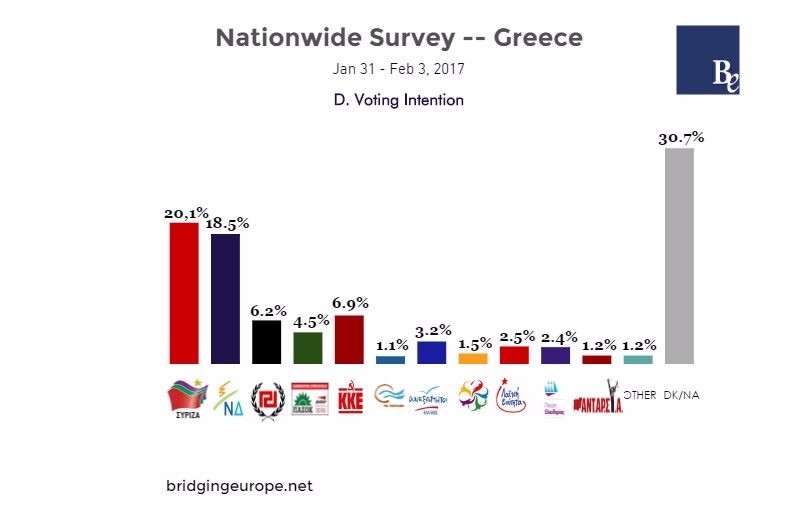 Δημοσκόπηση Bridging Europe: Μπροστά ο ΣΥΡΙΖΑ – Τρίτο κόμμα το ΚΚΕ (γραφήματα)
Δημοσκόπηση Bridging Europe: Μπροστά ο ΣΥΡΙΖΑ – Τρίτο κόμμα το ΚΚΕ (γραφήματα)
Η Bridging Europe έδωσε στη δημοσιότητα μια δημοσκόπηση που ανατρέπει την εικόνα που παρουσιάζουν οι υπόλοιπες. Στη δημοσκόπηση, που δημοσιεύεται στην ιστοσελίδα και τα social media της εταιρίας, στην πρόθεση ψήφου ο ΣΥΡΙΖΑ εμφανίζεται πρώτο κόμμα με 20,1%, ενώ η Νέα Δημοκρατία ακολουθεί με 18,5%.
Ως τρίτο κόμμα καταγράφεται το ΚΚΕ με 6,9%, ενώ ακολουθούν η Χρυσή Αυγή με 6,2%, το ΠΑΣΟΚ με 4,5% και οι Ανεξάρτητοι Έλληνες με 3,2%. Εκτός βουλής καταγράφονται η Λαϊκή Ενότητα με 2,5%, η Πλεύση Ελευθερίας με 2,4%, η Ένωση Κεντρώων με 1,5%, ενώ πάνω από το Ποτάμι που καταγράφει μόλις 1,1% βρίσκεται η ΑΝΤΑΡΣΥΑ με 1,2%.
|
Analysis by John D. Papadopoulos and Mario Schmidt This survey comes at a time talks on the conclusion of the second review of the Greek bailout have stalled. After two unsuccessful Eurogroup meetings in December 2016 and January 2017, hopes now lie on forthcoming gathering of Eurozone Finance Ministers in Brussels later this month. Time is pressing both sides, but especially the Greek side, as the coming months will be fueled with electoral tensions, domestic debates and political struggle. A. Review of the Greek Programme Similarly to previous surveys on the same topic (i.e. during 2016), the Greek government seems to be less affected by the blame-game taking place between all involving parts. Contrary to the harsh rhetoric of Greek opposition parties, the outright majority considers the German government as the major cause for delay toward concluding with the bailout review. The Greek government is the “least responsible”, alongside the EU institutions (i.e. the Commission and ESM), whereas the IMF seems “less responsible” in the eyes of the electorate comparing to previous surveys (e.g. check here). On the deadlock and the ways to move ahead, almost 50% of respondents does not believe the Greek government will legislate additional measures, although during the last couple of weeks there have been intense discussions on Greece’s fiscal consolidation plan beyond 2018. The fact that almost half of the citizens believe the government will not recede to further austerity demands can be a positive, useful tool for the Greek side in the negotiations with the creditors and determine its stance and alternative options to unlock developments. |
|
A considerable segment is also optimistic on the future of the Greek economy, believing that this fiscal programme will be the last one after seven years (i.e. eight after conclusion of current bailout) of hardrship, economic shrinkage and social tumult. Nonetheless, 1/3 of respondents does not seem optimistic, while a critical 23% has not developed a clear approach yet. As of the crucial, although deprived from public discourse, issue of whether the return to national currency would be a viable solution against the strenuous austerity programmes, it is clear that the absolute majority believes the real problem is the economic policy applied, and not the currency itself. Nonetheless, there is an important part of the Greek society that stands in favor of returning to national currency (i.e. as we have also seen in our previous studies in 2015) even if there is no concrete plan that gathers wide support. So far, the support for Grexit stays in a reactionary level, as a consequence against austerity and all these years of deep recession and the abrupt downfall of household income. B. Evaluation of Greek Government Programme – Stance of Opposition Parties |
|
Pretty unclear remains the perception on the efficiency of government’s daily public policy, as 48% sees “positive steps” whereas 42% sees “no positive steps”. There is much space for improvement and better results, but we should also acknowledge that having almost half of the citizens pointing out improvements in daily life, especially under the current strenuous conditions, it is something worth mentioning. The role of opposition parties and their contribution to drag the economy and the society outside the crisis is truly disappointing. 66% of respondents is standing “very negatively” or “negatively” as regards opposition parties stance in domestic politics, whereas 70% does not ascribe any positive role on them. This is an alarming fact for the entire political system and its leadership should take into account. As of the scenario of snap elections, an overwhelming majority sees no reason to do so. Reasons vary, but from our previous surveys we can come to the following conclusions. The majority does not want elections because a) there is no credible alternative to drag the country outside the financial deadlock; b) the current government still has a human and political capital available to invest in; c) positive developments -even not what properly expected- in social policy turn people more patient against financial hardship. To that end, popularity of PM Alexis Tsipras is noteworthy, especially when compared to his major opponent, ND party head Kyriakos Mitsotakis, who falls short of what his supporters and inner circle would possibly expect. Low popularity of Mr Mitsotakis is an important reason explaining to a certain degree why his party cannot gain further support and mobilize the electorate in a more consistent and engaging way. |
|
D. Voting Intention Support over Syriza party still remains high, slightly above 20%, but counting some important losses comparing to previous surveys. We cannot be certain whether this downward trend will continue or not in coming surveys, however it is interesting to note that around 2% of the party’s supporters has been moved to the undecided voters group – and not to any other political party. Front opposition ND party performs better than before, but without achieving to come first nor building on any promising agenda. From the smaller parties, the Communists keep their forces in good standing, while other left-wing parties solidify their good performance that could increase chances for finally passing the 3% threshold. What strikes our attention the most is the rate of undecided voters that surpasses 30%, for the first time since September 2015 elections. The big challenge for all parties is to gain advantage within this large pool of voters, although there is a risk a considerable part of them to abstain in the next elections. |





























